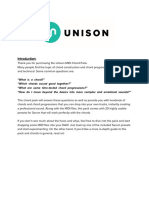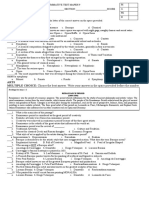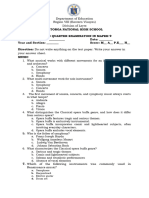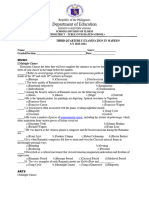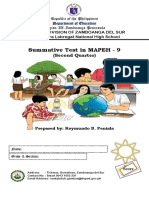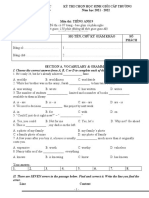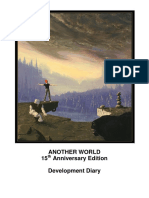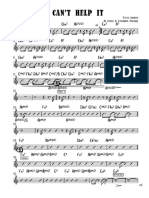0 ratings0% found this document useful (0 votes)
27 viewsSummative Test in MAPEH 9 Test I: Multiple Choice
Summative Test in MAPEH 9 Test I: Multiple Choice
Uploaded by
John Dominic PontilloThis document contains a summative test in MAPEH 9 (Music, Arts, Physical Education, and Health) with two sections - a multiple choice section and a true/false section. The multiple choice questions test knowledge on basic elements of rhythm, classical composers like Haydn and Mozart, drug abuse terminology, works by Michelangelo and Leonardo Da Vinci, and definitions of different types of dance. The true/false section contains statements about social dances, dance mixers, the cha-cha, artistic styles, and the social benefits of dancing. The answer key is provided at the end.
Copyright:
© All Rights Reserved
Available Formats
Download as DOCX, PDF, TXT or read online from Scribd
Summative Test in MAPEH 9 Test I: Multiple Choice
Summative Test in MAPEH 9 Test I: Multiple Choice
Uploaded by
John Dominic Pontillo0 ratings0% found this document useful (0 votes)
27 views3 pagesThis document contains a summative test in MAPEH 9 (Music, Arts, Physical Education, and Health) with two sections - a multiple choice section and a true/false section. The multiple choice questions test knowledge on basic elements of rhythm, classical composers like Haydn and Mozart, drug abuse terminology, works by Michelangelo and Leonardo Da Vinci, and definitions of different types of dance. The true/false section contains statements about social dances, dance mixers, the cha-cha, artistic styles, and the social benefits of dancing. The answer key is provided at the end.
Original Title
Mapeh w1
Copyright
© © All Rights Reserved
Available Formats
DOCX, PDF, TXT or read online from Scribd
Share this document
Did you find this document useful?
Is this content inappropriate?
This document contains a summative test in MAPEH 9 (Music, Arts, Physical Education, and Health) with two sections - a multiple choice section and a true/false section. The multiple choice questions test knowledge on basic elements of rhythm, classical composers like Haydn and Mozart, drug abuse terminology, works by Michelangelo and Leonardo Da Vinci, and definitions of different types of dance. The true/false section contains statements about social dances, dance mixers, the cha-cha, artistic styles, and the social benefits of dancing. The answer key is provided at the end.
Copyright:
© All Rights Reserved
Available Formats
Download as DOCX, PDF, TXT or read online from Scribd
Download as docx, pdf, or txt
0 ratings0% found this document useful (0 votes)
27 views3 pagesSummative Test in MAPEH 9 Test I: Multiple Choice
Summative Test in MAPEH 9 Test I: Multiple Choice
Uploaded by
John Dominic PontilloThis document contains a summative test in MAPEH 9 (Music, Arts, Physical Education, and Health) with two sections - a multiple choice section and a true/false section. The multiple choice questions test knowledge on basic elements of rhythm, classical composers like Haydn and Mozart, drug abuse terminology, works by Michelangelo and Leonardo Da Vinci, and definitions of different types of dance. The true/false section contains statements about social dances, dance mixers, the cha-cha, artistic styles, and the social benefits of dancing. The answer key is provided at the end.
Copyright:
© All Rights Reserved
Available Formats
Download as DOCX, PDF, TXT or read online from Scribd
Download as docx, pdf, or txt
You are on page 1of 3
Name:__________________________ Grade & section________________________
Score________________
Summative Test in MAPEH 9
Test I: Multiple Choice
Direction: Encircle the letter of your best answer.
1. Which of the following is the basic elements of Rhythm?
a. Beat, meter, tempo, syncopation c. monophonic, homophonic, polyphonic
b. Pitch, theme, conjunct, disjunct d. register, range, instrumentation
2. Which of the following classical composers who establish the forms and styles for
the string quartet and symphony. Haydn was a prolific composer, and some of his
most well known works are Symphony No. 92 in G Major, Emperor Quartet and
Cello Concerto No. 2 in D Major?
a. Wolfgang Amadeus Mozart c. Franz Joseph Haydn
b. Ludwig van Beethoven d. Thomas Morley
3. Which of the following classical composers rumoured to have had the ability to play
music at age three and to write music at aage five, Mozart began his career as a child
prodigy. Notable compositions include the Marriage of Figaro, Elvira Madigan, and
Clarinet Quintet in A Major?
a. Wolfgang Amadeus Mozart c. Franz Joseph Haydn
b. Ludwig van Beethoven d. Thomas Morley
4. The following are the composition of Franz Joseph Haydn, Except.
a. Symphony No. 92 in G Major c. Cello Concerto No. 2 in D Major
b. Emperor Quartet d. Marriage of Figaro
5. What is the term use of a substance incoherent or inconsistent with the prescribed
dosage or frequency of use is drug abuse?
a. Drug Misuse c. Drug Abuse
b. Drug Tolerance d. Drug Addict
6. On the Drug Scenario in the Philippines information, Which drug abuse is commonly
used by drug user in the country?
a. Rugby c. Cocaine
b. Marijuana d. Shabu
7. How Michealangelo di Lodovico Bounarroti Simoni did his approach in sculpture
named “ Pieta”?
a. Michealangelo approached the situation which the portrayal of pain had
constantly been related with the concept of redemption as represented by
means of the seated Madonna preserving Christ’s body in her arms.
b. Michealangelo uses Muscular with a suit of armor that appears as it did in
everyday life. His horse is depicted as feisty and strong.
c. Michealangelo used the challenge is combined with an additional episode from
thr Gospel in the decrease part of the painting.
d. It was the first known free – standing nude statue produced since ancient times.
8. How Leonardo di Ser Piero Da Vinci created” Mona Lisa”?
a. He inspires to create Mona Lisa by his home maid .
b. He undertook to paint for Francesco del Giocondo the Portait of Mona Lisa, his
wife.
c. He is extensively considered the loved he have with his partner.
d. He appreciate the woman called Mona so he painted it.
9. If you were Leonardo Da Vinci known as the remaining “Renasance man” due to the
fact of his intellect, interest, talent and his expression. Would you follow his
footsteps?
a. Yes, Because he is great to be a role model.
b. Yes, Because following him is the right thing to do.
c. Yes, Knowing his talent and intellect is a good cath for me to follow to receive
awards.
d. Yes, Because he is extensively considered to be one of the biggest painters of all
time and perhaps the most diversely talented, which can help others not
expecting in returns.
10. Which of the following is dance which is recreational and generally executed with a
partner and in groups or as a community activity for fun and enjoyment?
a. Social Dance c. Dancesports
b. Mass dance d. Cheer Dance
Test II. True of False
Direction: Write T if the statement is correct and F if not correct. Write your answer on the
blank before the number.
_________11. Social dances and dance mixers are also known as ballroom
dances.
_________12. Dance mixers are dances which allow group of performers to
change partners to maximize the social dimensions of dancing.
_________13. Cha-cha belongs to modern standard dance.
________14. Realism and Naturalism is an important aspect in Baroque Art.
________15. Social dancing does not improve your social life.
Answe Key:
1. B
2.C
3. A
4.D
5. A
6. D
7. A
8. B
9. D
10. A
11. T
12.T
13.F
14.T
15 F
You might also like
- Second Periodical Test in Mapeh Grade 9Document4 pagesSecond Periodical Test in Mapeh Grade 9Jane Clarissa Valdez88% (198)
- English Reading ActivitiesDocument2 pagesEnglish Reading ActivitiesSantiago Arellano29% (7)
- Unison MIDI Chord Pack (Instructional Walkthrough) PDFDocument15 pagesUnison MIDI Chord Pack (Instructional Walkthrough) PDFCArlo Francesco LopezNo ratings yet
- Summative Test in Mapeh 9Document4 pagesSummative Test in Mapeh 9Trishia Bon79% (24)
- TQ MAPEH 9 - 2ND QuarterDocument5 pagesTQ MAPEH 9 - 2ND QuarterAira A. Baylan95% (20)
- Second Diagnostic Test in Mapeh 9Document2 pagesSecond Diagnostic Test in Mapeh 9Mina Berdos Sabit100% (3)
- Grade 9 Q - 2 Periodical TestDocument7 pagesGrade 9 Q - 2 Periodical TestBadeth Ablao100% (1)
- Arts MULTIPLE CHOICE: Choose The Best Answer. Write Your Answer in The Space Provided Before The NumberDocument3 pagesArts MULTIPLE CHOICE: Choose The Best Answer. Write Your Answer in The Space Provided Before The NumberZaira jane Zarate100% (1)
- Mapeh 9 2nd QTR TST EDITEDDocument2 pagesMapeh 9 2nd QTR TST EDITEDDhaddy JP100% (1)
- Q2 Exam in MAPEH 9 (For Review)Document7 pagesQ2 Exam in MAPEH 9 (For Review)Ruffa May OlayaNo ratings yet
- Q2 Exam in MapehDocument3 pagesQ2 Exam in MapehJENY VEV GAYOMANo ratings yet
- 2nd Periodical Exam 2019 2020Document3 pages2nd Periodical Exam 2019 2020Cherilyn DequitNo ratings yet
- Mapeh 9 Second QuarterDocument7 pagesMapeh 9 Second QuarterMary CrisNo ratings yet
- 2nd Periodical Test Mapeh 9Document7 pages2nd Periodical Test Mapeh 9Aoi100% (2)
- 2nd Grading Exam in MAPEH 9Document2 pages2nd Grading Exam in MAPEH 9Jhomer CabantogNo ratings yet
- 2nd Summative Test in MAPEH 9Document4 pages2nd Summative Test in MAPEH 9reymon martinNo ratings yet
- Finals Exam (Mapeh 9) 3RD QuarterDocument5 pagesFinals Exam (Mapeh 9) 3RD Quartercorengentiloso02No ratings yet
- 2nd Quarterly Examination in Mapeh 9Document4 pages2nd Quarterly Examination in Mapeh 9Alanlovely Arazaampong AmosNo ratings yet
- 2nd Periodical Exam Test PaperDocument4 pages2nd Periodical Exam Test PaperAudrey Harold NavalesNo ratings yet
- MAPEHDocument5 pagesMAPEHElla CoridoNo ratings yet
- Mapeh 9 Q2Document4 pagesMapeh 9 Q2JESSMAR CORTEZNo ratings yet
- 2nd Exam in Mapeh 9Document3 pages2nd Exam in Mapeh 9Jenevey AlcoberNo ratings yet
- MAPEH 9 (2nd) (50 Items)Document4 pagesMAPEH 9 (2nd) (50 Items)ALVIN PASCONo ratings yet
- Mapeh 9 TQDocument4 pagesMapeh 9 TQRuthchel YaboNo ratings yet
- 2nd Grading Grade 9 2019Document4 pages2nd Grading Grade 9 2019Madel Abayon LastimosoNo ratings yet
- 2ND Exam - Mapeh 9Document3 pages2ND Exam - Mapeh 9Julius Magaru RaquelNo ratings yet
- Llamera National High SchoolDocument3 pagesLlamera National High SchoolGladez Lucaya GalagaranNo ratings yet
- Second Quarter Examination in Mapeh 9Document8 pagesSecond Quarter Examination in Mapeh 9Rhiza AnnNo ratings yet
- MAPEH Second QDocument3 pagesMAPEH Second QRyan AntonioNo ratings yet
- Mapeh 9Document5 pagesMapeh 9carmena b. oris100% (1)
- 2nd Diagnostic TestDocument2 pages2nd Diagnostic TestJeffrey DumangasNo ratings yet
- Mapeh 9 ExamDocument4 pagesMapeh 9 ExamBABY ANN BENASANo ratings yet
- MAPEH 9-2nd PTDocument4 pagesMAPEH 9-2nd PTSheryl Hesita OrtegaNo ratings yet
- 2 Summative Test in MAPEH 9Document2 pages2 Summative Test in MAPEH 9Shelene CathlynNo ratings yet
- Second Quarter Exam Mapeh 9Document2 pagesSecond Quarter Exam Mapeh 9Buena Fe chavez100% (1)
- Bais City: Mayor Praxedes P. Villanueva Ii Mhs Second Quarterly Exam Mapeh - Grade 9Document4 pagesBais City: Mayor Praxedes P. Villanueva Ii Mhs Second Quarterly Exam Mapeh - Grade 9Jhonabie Suligan CadeliñaNo ratings yet
- Second Quarter Summative Test in MAPEH 9bDocument6 pagesSecond Quarter Summative Test in MAPEH 9bMaricel Rabang RafalNo ratings yet
- 4TH Quarter Exam in Mapeh 10Document4 pages4TH Quarter Exam in Mapeh 10Razul Mike AbutazilNo ratings yet
- Mapeh 9 Exam 2ND QuarterDocument4 pagesMapeh 9 Exam 2ND QuarterRuel jacob TiuNo ratings yet
- Second MT - Mapeh9Document2 pagesSecond MT - Mapeh9marilou.armiaNo ratings yet
- 2nd Quarter Summative Test in MapehDocument4 pages2nd Quarter Summative Test in Mapehengelbert picardalNo ratings yet
- Mapeh 9 Pre TestDocument2 pagesMapeh 9 Pre TestROselle Mae Noval LopezNo ratings yet
- Remedial Examination MAPEH 9Document5 pagesRemedial Examination MAPEH 9cristelannetolentino6No ratings yet
- Q4 Grade-9-Tq MAPEHDocument3 pagesQ4 Grade-9-Tq MAPEHJunrel SapantaNo ratings yet
- Ade 9 Diagnostic Test 2020 2021Document3 pagesAde 9 Diagnostic Test 2020 2021ArthurBucaligNo ratings yet
- SUMMATIVE TEST IN MAPEH 9 2nd QuarterDocument5 pagesSUMMATIVE TEST IN MAPEH 9 2nd QuarterJosephine Gulmatico Coronado100% (2)
- Third Quarter Exam Mapeh Grade 10 Converted111Document2 pagesThird Quarter Exam Mapeh Grade 10 Converted111Juan Paulo GacillaNo ratings yet
- MAPEH 9 2nd Quarter ExamDocument2 pagesMAPEH 9 2nd Quarter ExamLouie Ric Fisco100% (4)
- 2nd Quarter Summative Test in MAPEH 9 2021Document2 pages2nd Quarter Summative Test in MAPEH 9 2021Manny Diaz67% (3)
- Music - Summative TestDocument5 pagesMusic - Summative TestJessa Banawan EdulanNo ratings yet
- 2ndQ Pandemic Summative Test in MAPEH-9Document4 pages2ndQ Pandemic Summative Test in MAPEH-9Reymundo PenialaNo ratings yet
- Grade 9 TQDocument5 pagesGrade 9 TQMarianne HingpesNo ratings yet
- Q2 MAPEH 9 Long TestDocument5 pagesQ2 MAPEH 9 Long TestSheena San GabrielNo ratings yet
- NAME: - Grade & Section: - ScoreDocument4 pagesNAME: - Grade & Section: - ScoreJenivanValezaAvilaNo ratings yet
- Grade 9 Unit II ExamDocument4 pagesGrade 9 Unit II ExamBenie Bulusan BaritNo ratings yet
- 2nd Quarter Exams - MAPEH 9Document8 pages2nd Quarter Exams - MAPEH 9Hermoso DP100% (3)
- 3rd Quarterly Examination in MAPEH 9Document5 pages3rd Quarterly Examination in MAPEH 9Jesson C. AcibarNo ratings yet
- 3RD Quarter Unit Examination - Mapeh 9Document39 pages3RD Quarter Unit Examination - Mapeh 9Debie-Anne CianoNo ratings yet
- 2ND Review Questionnaire Grade 9Document2 pages2ND Review Questionnaire Grade 9Sean Gabriel LacambraNo ratings yet
- Fantastic Sixties Trivia Book: Everything You Should Have Remembered Or Need To Know About The 1960sFrom EverandFantastic Sixties Trivia Book: Everything You Should Have Remembered Or Need To Know About The 1960sNo ratings yet
- Name: Khofifah Harahap Class: 4F TOEFL EXERCISE (Skills 6-8) : Choose The Letter of The Word or Group That Best Completes TheDocument2 pagesName: Khofifah Harahap Class: 4F TOEFL EXERCISE (Skills 6-8) : Choose The Letter of The Word or Group That Best Completes TheKhofifa Harahap0% (1)
- Navidad en La Tierra y El Mar PianoDocument2 pagesNavidad en La Tierra y El Mar PianoHernando RoseroNo ratings yet
- Julian K Jarboe Everyone On The Moon Is Essential Personnel Lethe Press - 2020Document173 pagesJulian K Jarboe Everyone On The Moon Is Essential Personnel Lethe Press - 2020Marcos Arthur VianaNo ratings yet
- 1 Pixinguinya Suite-Retratos MandolinaDocument2 pages1 Pixinguinya Suite-Retratos MandolinaManuel Perez GilNo ratings yet
- 2 Le Pronom COI PDFDocument2 pages2 Le Pronom COI PDFDevesh SunflexNo ratings yet
- CTRVRDocument2 pagesCTRVRcatalina gilNo ratings yet
- 5 Centimeters Per Second - Kanae No Kimochi (Rhythm Guitar)Document2 pages5 Centimeters Per Second - Kanae No Kimochi (Rhythm Guitar)oediphusNo ratings yet
- A Tradeoff Between Energy and Bandwidth Efficiency in Wireless NetworksDocument7 pagesA Tradeoff Between Energy and Bandwidth Efficiency in Wireless NetworksMohammed AbobakerNo ratings yet
- Quantum QT 710 TableDocument60 pagesQuantum QT 710 TablezakreaNo ratings yet
- Grade 8 ExamDocument2 pagesGrade 8 Examcean100% (1)
- Make Your Bed and Megan MarkleDocument1 pageMake Your Bed and Megan MarklelalalalaNo ratings yet
- STAGE 1 Week 1 Term 3 - at Home LearningDocument10 pagesSTAGE 1 Week 1 Term 3 - at Home LearningEuro KremNo ratings yet
- El 104 Unit 1 Compiled Written ReportsDocument36 pagesEl 104 Unit 1 Compiled Written ReportsAndrea R. CanoNo ratings yet
- ĐỀ THI HSG CÂP TrườngDocument7 pagesĐỀ THI HSG CÂP TrườngThùy Anh NguyễnNo ratings yet
- Ceon Rumphs Honorsthesis PDFDocument91 pagesCeon Rumphs Honorsthesis PDFBeltrán GonzálezNo ratings yet
- Violin Concerto in A Minor Aqa GuideDocument4 pagesViolin Concerto in A Minor Aqa GuideO ThomasNo ratings yet
- LTE Network Planning by Alemnew, Tigabu and MulukenDocument29 pagesLTE Network Planning by Alemnew, Tigabu and MulukenAmare Kassaw100% (2)
- Underwater Communication Through Li-Fi For Data TransmissionDocument5 pagesUnderwater Communication Through Li-Fi For Data Transmissionanes EssidNo ratings yet
- Another World - Development DiaryDocument42 pagesAnother World - Development DiaryBiblioteca Casino CentralNo ratings yet
- Chapter 6 Metallic Waveguide and Cavity ResonatorsDocument24 pagesChapter 6 Metallic Waveguide and Cavity ResonatorsBang JagoNo ratings yet
- ManusDocument31 pagesManusSusanna BrionesNo ratings yet
- All About Amps Vol 18Document22 pagesAll About Amps Vol 18Ale BouwmanNo ratings yet
- Kingdom Hearts 2 - Missing YouDocument1 pageKingdom Hearts 2 - Missing YouJaime Edward Elric RegisNo ratings yet
- Death From Above 1979 - NomadDocument6 pagesDeath From Above 1979 - NomadVictor DantasNo ratings yet
- Garth BrooksDocument5 pagesGarth Brooksapi-608275465No ratings yet
- Music To Mp3Document9 pagesMusic To Mp3dSolarianNo ratings yet
- Script Writing For Radio and Television: March 2014Document10 pagesScript Writing For Radio and Television: March 2014Quin JayNo ratings yet
- I C Help It - Electric GuitarDocument2 pagesI C Help It - Electric GuitarDaan Demeyer100% (1)


